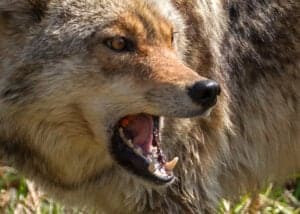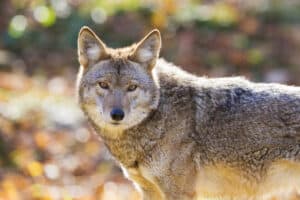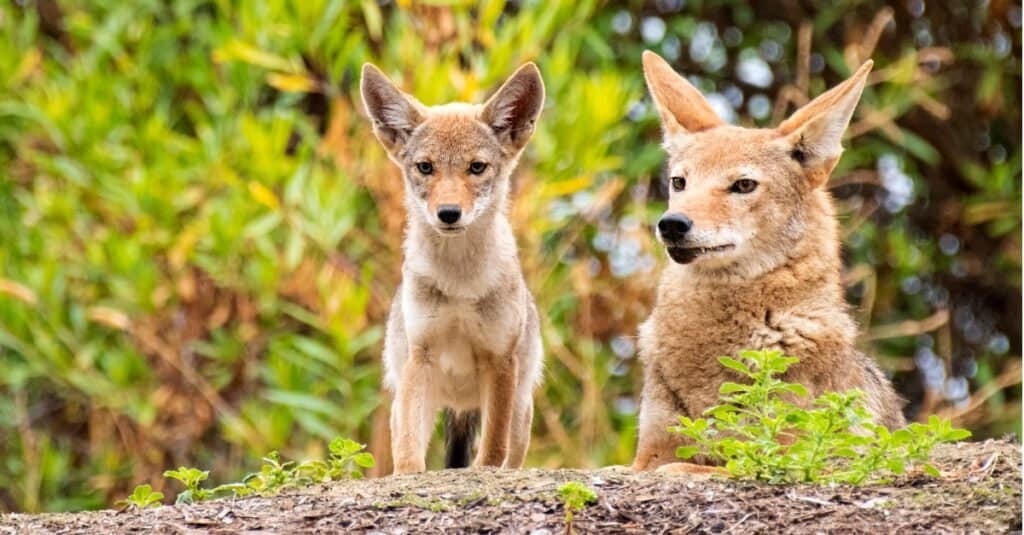
Coyotes are difficult to domesticate. This is because they have evolved to survive in the wild.
©iStock.com/roclwyr
Many people wish to raise coyotes as pets, however wild animals like coyotes are difficult to domesticate like dogs. They have evolved feral impulses to survive in the wild. Some humans have successfully tamed wild coyotes through domestication methods, but this is not recommended.
Although rare, coyotes are known to attack humans. Keep reading to learn why you should not try having a pet coyote.
Top 5 Reasons You Should Not Domesticate a Coyote
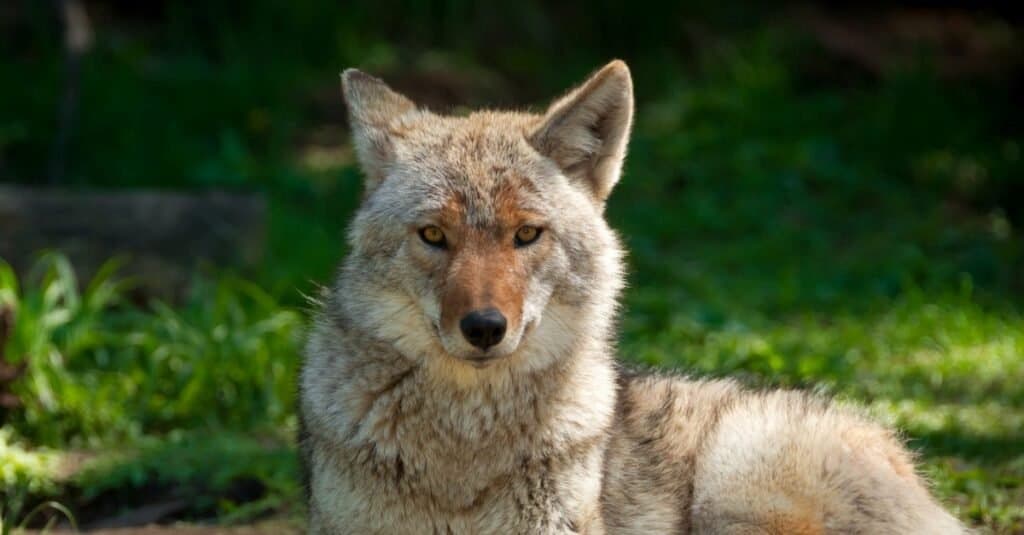
Coyotes are quite territorial and would not do well in a confined space. They are wild and need to roam.
©iStock.com/GatorDawg
Diseases
Coyotes can spread diseases such as rabies, distemper, and canine hepatitis. These diseases can spread to humans and other animals.
Insatiable Appetite
Even as pets, coyotes are carnivores. For example, a coyote can eat your cats or birds. In addition, if not properly fed, they can feast on your chickens or livestock.
Wild Nature
Unfortunately, most domesticated animals end up chained or leashed in their backyards or other outdoor spaces. Coyotes can get crazy and start breaking things if they’re kept in small, confined quarters or in a house. This is because they are wild and do not possess the capacity to be tamed.
Territorial
Even if you have a larger dog or animal in the house, you’re likely to see a lot of fighting. Due to the coyote’s feral nature, the other pet is almost always defeated in a battle.
Other People
Even if you manage to woo this animal, it may take a long time before becoming open to other humans. They might be highly aggressive to your friends, neighbors, and family members.
Imagine taking your coyote pet for walks in the park as you would with a typical dog without feeling confident with its temperament.
Many people end up killing these animals when they confront them. If by any chance your pet gets lost, it might be shot by gun-wielding property owners.
Why You Should Not Feed or Befriend Wild Coyotes
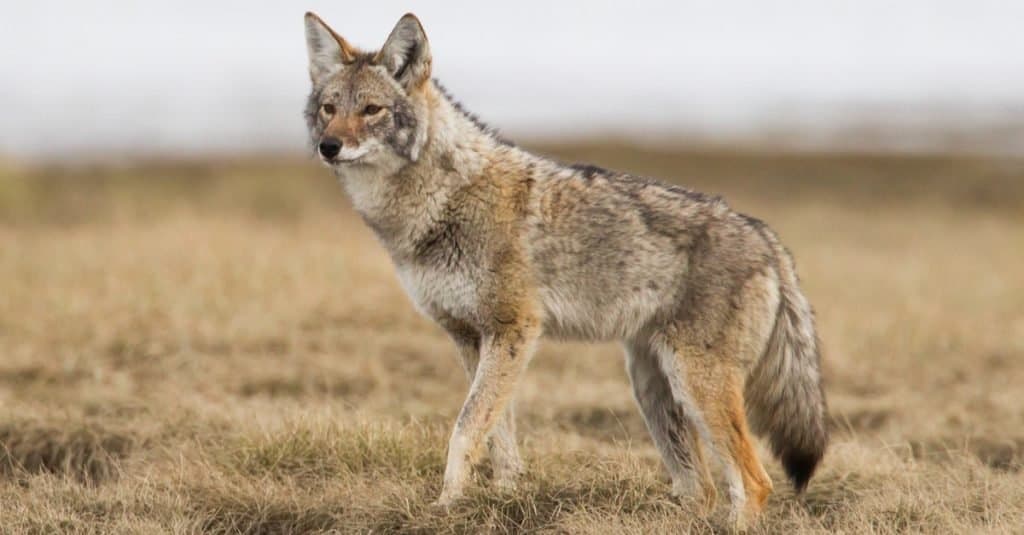
Coyotes are extremely bold predators, who will sometimes attack pets in the presence of humans.
©Jukka Jantunen/Shutterstock.com
Instead of domesticating a coyote, why not befriend one? While it may be tempting to feed and be around a creature that resembles man’s best friend, do not do so.
Coyotes are becoming more aggressive towards humans in urban and rural regions. Dozens of attacks on youngsters in California and on the Eastcoast prove that we should recognize the coyote as a possible predator.
Coyotes In Urban Areas
Large coyote populations exist in Texas cities. Coyotes are tougher to control the closer they approach cities. Hunting is prohibited within most city limits and most places on the fringes of large cities. This allows coyotes to thrive with little control over their numbers.
City coyotes are daring and will raid garbage cans, steal your pet’s food, and possibly eat your dog. Los Angeles is home to an estimated 5,000 coyotes.
Increase In Coyote Attacks
When they are seen in the city during the day, most people mistake coyotes for dogs. Some even welcome them into their backyards. As a result, once rare coyote assaults on humans have surged in the last decade.
In California, 89 coyote attacks occurred including children, adults, and pets. In 56 of these attacks, someone was hurt. Coyotes stalked youngsters, chased people, or threatened adults in 77 of these cases.
What About Hybrid Coyote Dogs?
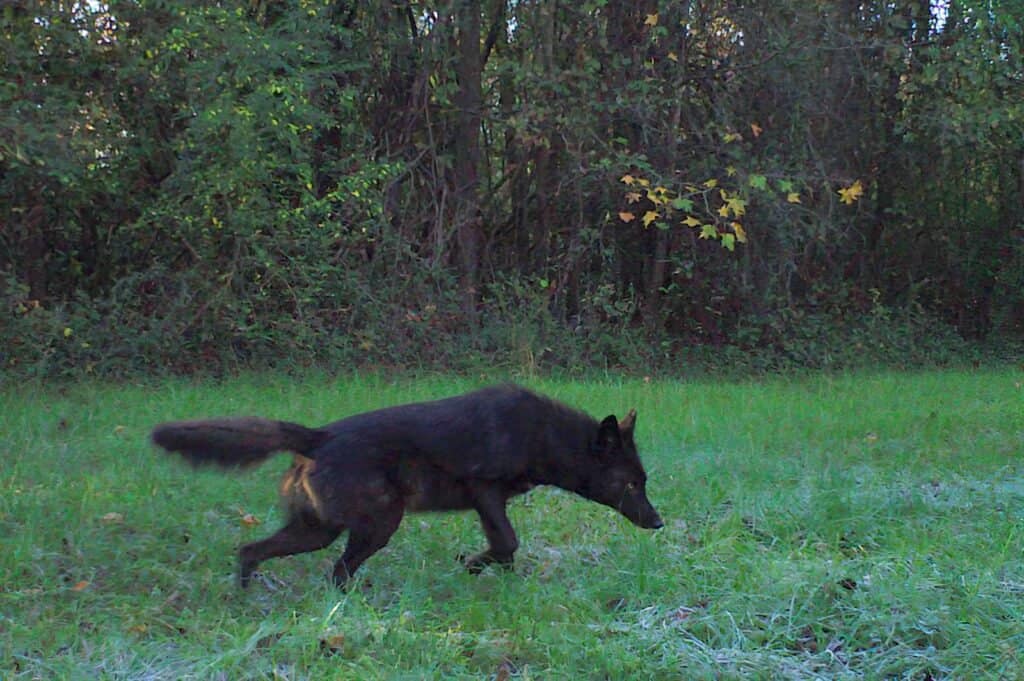
Coydogs are coyote-dog hybrids, which have a reputation for being temperamental.
Coyote and domesticated dogs are known to be crossbred. They are called coydogs. While lovely in appearance, these coyote crossbreeds can be quite temperamental. Wild canines and domesticated dogs have decades of temperamental and genetic changes that separate them.
We already know that wild dogs like coyotes and wolves may mate and procreate with domesticated dog breeds because of the popularity of wolf-dog hybrids. And, unlike other animal hybrids like the liger (tiger-lion crossbreed) or the mule (donkey and horse crossbreed), coydog hybrids can even produce fertile pups.
Natural breeding of coyotes with dogs is unlikely. Why? First, they don’t match up when domestic dogs and coyotes are in heat. Also, they are unlikely to get along as they are very different in nature. Humans usually purposely create coydog hybrids.
Where Do Urban Coyotes Live?
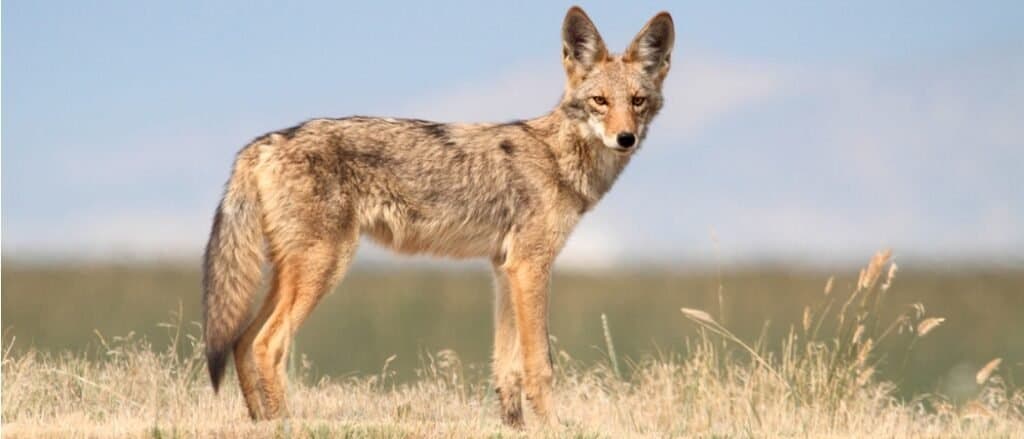
Urban environments offer these adaptable canines an extensive range of accommodation options.
©iStock.com/SteveByland
Ever wondered where these new urban invaders hang out before emerging at dawn or dusk? Coyotes are impressively adaptable and urban environments offer these wily canines a host of options in terms of accommodation. They are not above digging dens in the soft soil; they may also sleep out in the open or snuggle under bushes — the thicker the better, especially close to the freeway. Storm drains are also another attractive option as are wood piles. They might also decide to move into abandoned houses.
In Conclusion
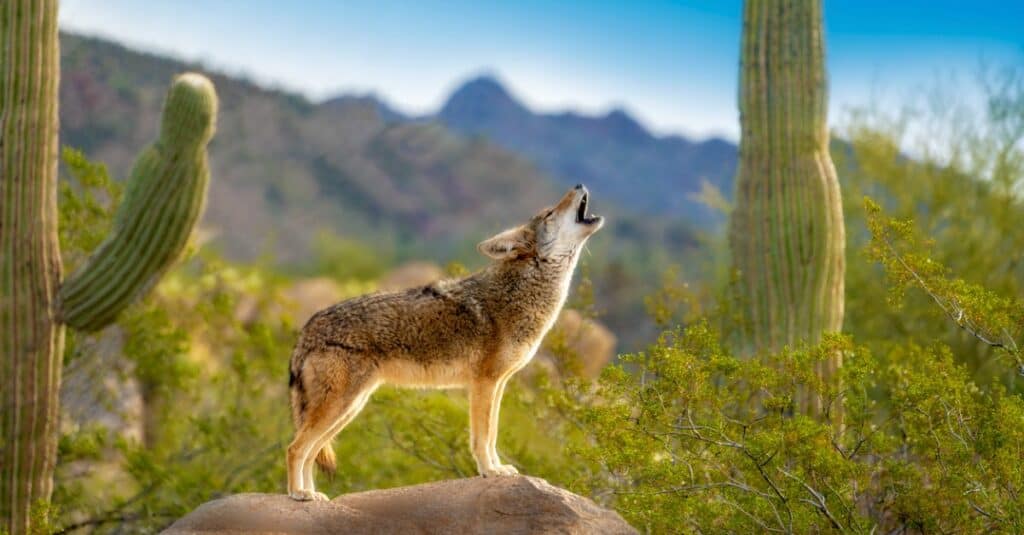
Keeping a coyote as a pet is not advised. Do not feed coyotes either. This can make them bold.
©JayPierstorff/Shutterstock.com
Coyotes are wonderful animals that are far more adaptive than their red and gray wolf cousins. However, overall, keeping coyotes as pets is difficult and not advised. We should let coyotes exist free of human interference.
Coyotes are predators and can spread rabies and cause damage to property, pets, and cattle. This is not designed to scare, but to educate people about potential coyote attacks. The essential point is that people should never feed or attempt to domesticate these animals. Feeding predatory animals teaches them to lose their fear of humans and become erratic in behavior.
If you live near woods, marsh, or fields, don’t be afraid, but keep a safe distance from coyotes.
Bonus: Why Are Coyotes Everywhere Now?
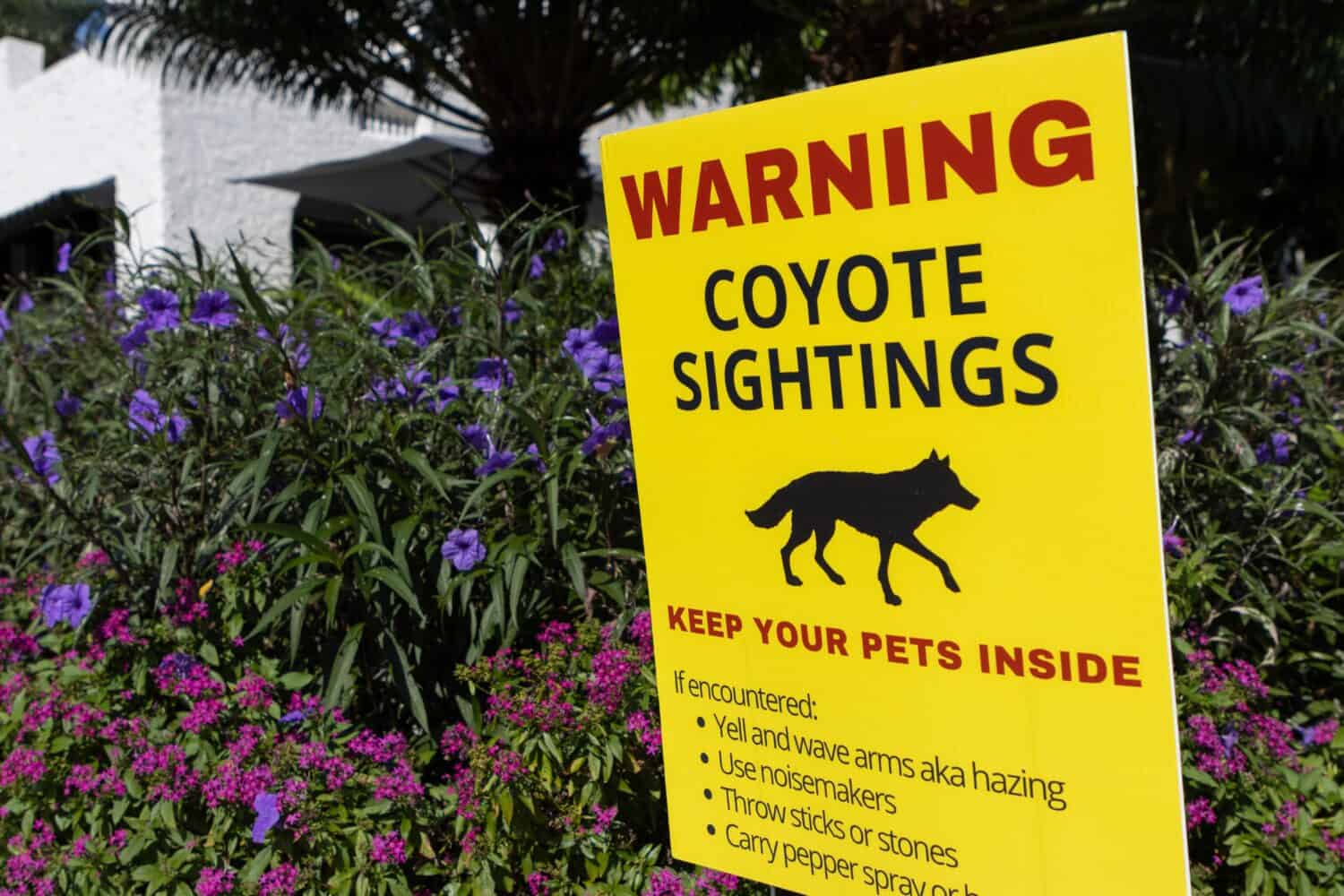
No neighborhood is immune to coyotes.
©Ajax9/Shutterstock.com
Not that long ago, a coyote was synonymous with the prairies and deserts of the great American West along with cowboys and wagon trains. Now, they are everywhere – in cities, neighborhoods, and land all across the United States. Coyotes thrive in urban areas because they take advantage of any little patch of habitat and they will eat anything – garbage, pet food – even pets themselves.
How have they expanded their range so quickly and thoroughly? Coyotes have been on the move since the 1800s – when European settlers transformed the native landscape through logging and agricultural development. This created more open habitats in eastern states – and the coyotes moved in as land opened up. This happened as humans attempted to exterminate wolves and cougars, which decreased competition for coyotes. They took advantage of every opportunity.
Coyotes are highly adaptable and seem to like golf courses and parks. They aren’t picky about where they sleep at night – often just sleeping out in the open or under a shrub in someone’s yard. Experts have no idea how many coyotes there are – estimates range from one to 10 million in North America. There are just too many to count, with their numbers increasing.
The photo featured at the top of this post is © iStock.com/jamesvancouver
Thank you for reading! Have some feedback for us? Contact the AZ Animals editorial team.





